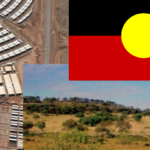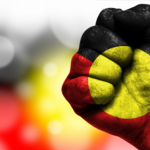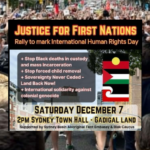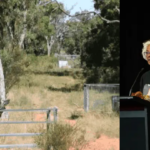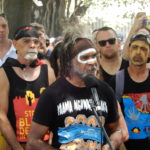The Wunna Nyiyaparli Have Been Stripped of Roy Hill Native Title Rights Based on Void Documents
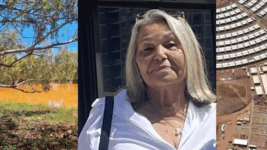
The Wunna Nyiyaparli people of Western Australia’s eastern Pilbara region continue to be shafted out of their native title rights over Roy Hill, which is Country they hold sovereign rights to “speak for” and Gina Rinehart runs an iron ore mine upon. And after the Federal Court determined the Wunna Nyiyaparli don’t exist in 2016, they’ve now ascertained this process was based on void documents.
The legal landscape relating to Wunna Nyiyaparli Country and Hancock Prospecting’s Roy Hill mine has become increasingly complex and contested. Native title claims were initially made over a larger parcel of land filed by the broader Nyiyaparli language group in 1998, and a series of changes to this claim continued until its 2018 approval and in fact, all claims post 2010 appear void.
The Wunna Nyiyaparli filed a native title claim with the Federal Court in 2012, and it was sent to the National Native Title Tribunal to undergo the registration test that had been added to the Native Title Act 1993 (Cth) on 30 September 1998. The 2012 Wunna Nyiyaparli claim passed the test, which they assert suggests an issue with the 1998 Nyiyaparli claim that had been lodged prior.
The void claim is being raised now, after the court dismissed the 2012 Wunna Nyiyaparli claim in 2016, and elder Ailsa Roy went on to lodge a complaint to the United Nations Human Rights Committee in 2019. The CCPR then found the clan had been denied cultural rights and procedural fairness, and in 2023, it ordered that the Wunna Nyiyaparli be provided “an effective and enforceable remedy”.
The CCPR is a respected global body, and its determinations hold weight. Yet, then attorney general Mark Dreyfus thought it best to tell the CCPR that it was wrong in its assessment, 9 months after the 180 day deadline to provide remedy had run out. And while this process now appears flawed due to void documentation, the challenge for the Wunna Nyiyaparli is how to seek justice in respect of this.
Cut out of the equation
The Wunna Nyiyaparli continue to live largely in accordance with traditional laws and customs, with their culture being inextricably linked to the Roy Hill parcel of land that’s currently being mined by Rinehart. Their Country provides their ability to live, hunt and fish as per their culture.
The 15 March 2023 adopted view of the CCPR in respect of Ailsa’s complaint further noted that on 26 September 2018, the Federal Court accepted the Nyiyaparli claim, despite it capturing Wunna Nyiyaparli Country, and as a result, the latter clan have been left with “no traditional rights to control access” to their land and others interested “in mining exploitations on these lands” are in control.
Mining interests are blocking access to Country, which poses an existential threat to the Wunna Nyiyaparli. And not only does the Roy Hill mine sit within both the 1998 native title claim of the Nyiyaparli and the 2012 Wunna Nyiyaparli claim, but Fortescue Metals Group operates the Christmas Creek and Cloudbreak mines on the broader Nyiyaparli area, which was formally recognised in 2018.
The 200-odd people making up the Wunna Nyiyaparli clan draw their link to Roy Hill via the lineage of William Coffin, who was linked to the land prior to British colonisation. Roy points to documentation that verifies these linkages, however, when the Wunna Nyiyaparli went to court to argue their sovereign rights to speak for Country, they were unprepared to argue their heritage.
Two Indigenous land use agreements (ILUAs) lodged with the NNTT six months prior to the filing of the Wunna Nyiyaparli claim, threw its validity into dispute. The Federal Court then determined to rectify any conflict between the two native title claims. Justice Richard White, however, determined to first hear a separate question as to whether the Wunna Nyiyaparli are really Nyiyaparli people.
The court then further neglected to ensure the Wunna Nyiyaparli representatives were aware of the separate question prior to the 11 July 2016 hearing. This resulted in the three unprepared representatives at court being locked out of proceedings they didn’t consent to, and the court went on to ascertain that the Wunna Nyiyaparli people, including the three in the court, do not really exist.
The void documents
After a decade of mulling over all the documentation relating to the native title claims and court hearings, the Wunna Nyiyaparli, who continue their fight to regain their ability to speak for the Roy Hill parcel of land, have realised that somewhere along the line, the ongoing amendments to the 1998 Nyiyaparli native title claim have resulted in it being void, despite it having later been approved.
Numerous amalgamations of various claims, and the removal and addition of participants in them occurred in respect of the 1998 Nyiyaparli claim.
Over this period, William Coffin was added to the 1998 claim, which served to make the Wunna Nyiyaparli part of it, but Coffin was then later removed. And the Wunna Nyiyaparli have uncovered that since 2010, the Nyiyaparli native title claims appear to be illegitimate due to a certain filing.
In 2005, a version of the many times amended 1998 Nyiyaparli claim was left unregistered and therefore, voided. But during further changes to the 1998 Nyiyaparli claim in 2010, the 2005 voided version of it was submitted to the court, and this was then progressed using the void version and to top it off, this filing continued to be labelled with the 2005 listing, and not a new number.
Under native title law, a claim like the void one from 2005 cannot be revived. So, the Nyiyaparli claim raised in the 2016 case involved an unregistered document that no longer applied, and the further point that reveals the filing was void, is that the 2012 Wunna Nyiyaparli claim passed the registration test, despite it covering the land at Roy Hill, even though the 1998 Nyiyaparli claim also covered it.
Native claims must not overlap with one another, however, which means the 1998 Nyiyaparli claim was not active, according to the NNTT assessed outcome in respect of the 2012 Wunna Nyiyaparli claim to the Roy Hill parcel of land.
Genocide by any other name
This finding reveals that not only did the Federal Court deny procedural fairness to the Wunna Nyiyaparli and the Australian government told the CCPR to rack off as it was satisfied with the duplicitous manner in which justice has been denied, but in the end, as it turns out, a major clerical error occurred in 2010, which should mean that all proceedings following it, no longer apply.
One can imagine if the Australian government or a local corporation or even a foreign corporation has discovered that an unfavourable court ruling had been made in response to them based on documents that were void, that the authorities and the courts would then be arranging for a prompt retrial.
In settler colonial Australia, however, it’s unlikely that the authorities will be leaping at the prospect of allowing the Wunna Nyiyaparli people, whose land is currently being mined by one of the nation’s leading mining magnates, to have their legitimate day in court, as it might mean that iron ore mining profits are somehow depleted.
The ready assessment of what has happened to the Wunna Nyiyaparli in having their ways of life denied, due to their access to Country being blocked, along with the Federal Court ruling that they do not exist at all, is to term it a form of cultural genocide.
Yet, denying the Wunna Nyiyaparli the ability to exercise their cultural rights means that what makes them a distinct people is being erased, and the crime of genocide is understood to take place, when destructive life conditions are inflicted upon the group that result in their destruction in part or in whole.
So, this means the Australian state is currently committing genocide against the Wunna Nyiyaparli.
As for Ailsa Roy, she told Sydney Criminal Lawyers that the Wunna Nyiyaparli “feel cheated, defrauded, disappointed, disgusted, denied, disrespected, demoralised, disenfranchised and discarded.”
“I feel sick to my stomach at the desecration and loss of land that belongs to us,” the Wunna Nyiyaparli elder continued.
“The authorities need to consider our pre-native title sovereign rights and consider how the law and legislation have been corrupted.”


